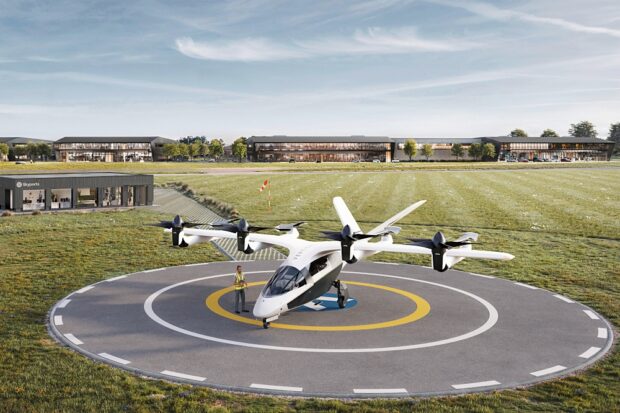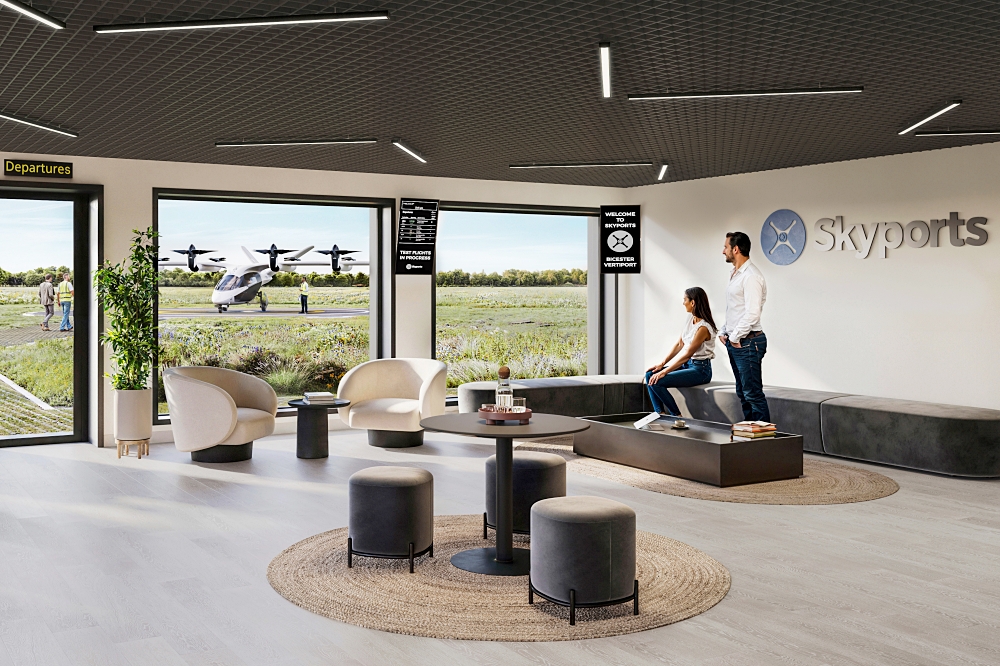Skyports Infrastructure has unveiled designs for the UK’s first permanent vertiport testbed for the electric air taxi industry, alongside partners Bicester Motion, the 444-acre future mobility estate in Bicester, Oxfordshire, and Vertical Aerospace, a global aerospace and technology company pioneering zero-emissions aviation through the development of electric vertical take-off and landing aircraft.
The images have been released as the project receives planning permission from Cherwell District Council. It is the first permanent UK vertiport infrastructure proposal to secure planning consent.
The images show the vertiport positioned adjacent to Bicester Motion’s existing general aviation grass runways, where it will continue the airfield’s long history of aerospace innovation. The vertiport will include a compact 160 sq. m passenger terminal which will be a critical facility for testing ground infrastructure and flight operations and will play a significant role in enabling the next generation of electric, low noise aviation in the UK.
The new designs showcase Vertical’s latest VX4 prototype, which will be the first electric vertical take-off and landing (eVTOL) aircraft to fly at the Skyports vertiport. The VX4 is designed to be piloted, carry four passengers and has a range of up to 100 miles. The aircraft successfully completed its first tethered piloted flight in July and is now progressing through its robust piloted test flight programme. Vertical will use the Skyports vertiport to conduct demonstration flights and test key procedures ahead of commercial launch.
The new renders also depict the interior of the vertiport, which will be equipped with Skyports’ proprietary vertiport technology solutions, including its Resource Management and Scheduling System (RMSS) and its Vertiport Automation System (VAS).
Construction of the vertiport will begin in the Autumn.
Duncan Walker, chief executive, Skyports said:
“With the green light from Cherwell District Council, now begins the exciting stage in vertiport development: building it. The tests and trials we conduct at this facility will be instrumental to the future of quiet, electric, vertical flight. Our vertiport at Bicester Motion will facilitate important learnings and demonstrations that advance the adoption of AAM. We are proud to be playing a pioneering role in shaping the future of this exciting industry in the UK”
Daniel Geoghegan, chief executive, Bicester Motion said:
“This is a significant moment for Bicester Motion and the future of aviation here. The former RAF Bicester was born in a period of intense technological innovation and played its role in 1938 when the Halifax prototype L7244 flew its maiden trial flights from Bicester.
“Today, we continue to welcome aircraft from all eras including new mobility technologies to provide a viable future for our historic airfield through such pioneering partnerships as Skyports. The vertiport green light enables us to continue to host such aviation innovation and advance a world where sustainable and accessible electric aviation is in reach for all, with Bicester Motion at the centre.”
Michael Cervenka, Chief Commercial & Technology Officer at Vertical Aerospace, said:
“The Skyports vertiport is a critical piece of infrastructure, helping to get our VX4 aircraft up into the air and demonstrate to the world that the future of flight is electric. We’re excited to see what the vertiport will look like as we move into an important phase of the industry – making this real. The tests we carry out here in Bicester with our VX4 will advance our understanding of electric aviation and revolutionise how we travel – paving the way for zero emissions, quiet flight.”
The vertiport is being developed as part of the Advanced Mobility Ecosystem Consortium: a group of leading British aviation, technology and transportation organisations pioneering AAM in the UK, backed by the UK Research and Innovation (UKRI) Future Flight Challenge. The vertiport will serve as a key node for the Consortium’s wider testing programme, including demonstration flights, ground operations, aircraft integration, and public and stakeholder engagement.
James Richmond, Head of Future Flight at Consortium lead AtkinsRéalis, said:
“The vertiport living lab will go beyond demonstrating flight procedures and will validate the entire ecosystem the partners have created from the ground up. Gaining planning consent was a critical milestone and provided important learning for all stakeholders involved, helping to enable and scale advanced air mobility in the UK.”
Source: Skyports


